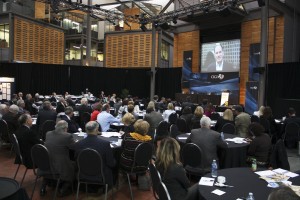City of Waterloo: intelligent or wise?

A prominent characteristic of our age is the speed with which we have pushed outwards the boundaries of knowledge.
There have been more scientific, technological and social changes in the last 75 years than in all preceding recorded history. But, while the human intellect has been straining forward to gain greater control over the “phenomena of nature”, others, no less modern, have been attempting to gain a deeper understanding of the complexities of the human condition—in other words, these people have been studying wisdom.
Having lived in Waterloo for a third of its 150-year history, I also celebrate its acclaimed status as an “intelligent city”. I would, however, urge some caution. I would hope that Waterloo might qualify too, as a wise city and wise community, not merely a smart one.
Typically, we do worship intelligence and rarely consider the topic of wisdom. Some wisdom is difficult to define, it is a rather vague notion, just the sort of baggage held responsible for philosophy’s failure to accompany the natural sciences into the 21st century.
Additionally, psychology, which has been thought by many as the perfect discipline to study wisdom, has dedicated itself to logical positivism; studying definable surface structures and suggest that deep wisdom may not be measured. Wisdom too, is thought the prerogative of old age and guided by the dominant machine and computer metaphors; we have changed aging into a very bad thing.
Getting older means getting worse and time is indeed a thief. Thus, we must leave the world in the hands of the young and intelligent.
Finally, the general public considers intelligence more important than wisdom, for intelligence involves thinking logically, speedily, and with the ability to abstract from reality.
While such skills are essential, wisdom struggles to grasp complex human nature, that often operates on the principles of contradiction, paradox and change. Wisdom involves understanding oneself, others and the nature of the human condition.
As Waterloo considers itself to be intelligent, we should beware of such pride. Philosopher Gabriel Marcel warns that wisdom provides a guard against hubris, pride or conceit, which usually accompanies mastery and control. The intellect is often seen as an instrument of conquest while wisdom is seen as a means of harmony.
Barbara Tuchman, a history professor at Harvard, delivered an address to the American Military Academy on the lack of “wisdom” in the decisions of historical and contemporary political and military figures. She claimed such decisions had one thing in common: a striking absence of any consideration for what might be beneficial for the people.
Questions of “should” were rarely considered by these leaders on a level that reached beyond their own egos. Wisdom, on the other hand, transcends the individual and reflects meaningful patterns in the self, others and the universe.
Wisdom most of all involves a deep and abiding caring for others and the world which is a central virtue and strength throughout a person’s and city’s stages of life.
So while living in an intelligent city may be nice, wisdom is much better.
No matter how intelligent we think we may be, if we are left to ourselves we can commit some grave errors.
And I occasionally wonder whether or not Waterloo could even qualify beyond an “intelligent city” but as a wise city too.
Don Morgenson is a professor of psychology at Wilfrid Laurier University
letters@thecord.ca


